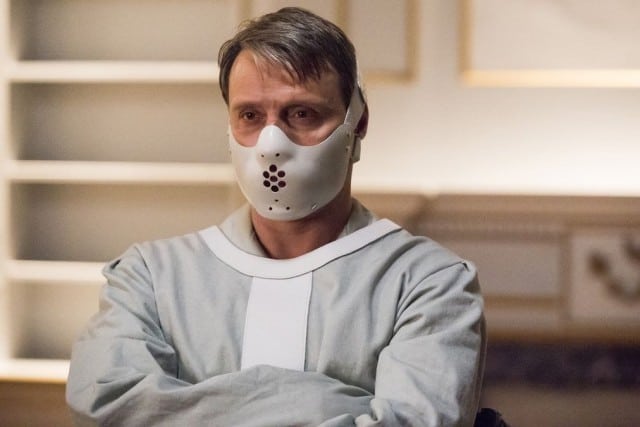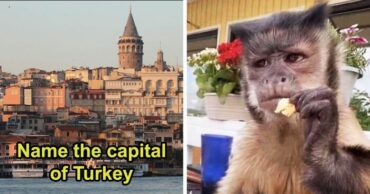
When Season 3 of Hannibal began, the good doctor Lecter invited us to consider his story in a surprising context: “Let it be a fairy tale, then. Once upon a time…” Twelve weeks later, even though we commonly think of the series as a crime procedural (or else some variation on that that centers on killing), the fairy tale structure holds up. “The Wrath of the Lamb,” quite possibly the final episode of Bryan Fuller’s adaptation of Thomas Harris, populates itself with fairy tale allusions: Hannibal telling Alana that he spun her gold being the most obvious line of dialog and the heroes coming together to kill a dragon being the most obvious image. But where I see the fairy tale format work best in “The Wrath of the Lamb,” which has received some wonderfully delicious mixed responses, is in its treatment of the concept of true love. Rather than say true love protects the finale from certain criticisms, I would prefer to do what I’ve always done with these reviews: explore an idea and how it relates to what we’re being presented in a given episode of Hannibal. You can read about whether I liked or disliked it all in the “Bite-Sized Thoughts” section below, but Hannibal is at its best when it is looked at not for its quality as a TV series, but for its ability to help us see things about ourselves.
The discussion hinges on the idea that true love exists in the world of Hannibal, which is easier to accept given the fairy tale idea. In our own separate worlds, we may or may not agree with true love as a concept, but Fuller clearly intended it to be a part of the story of Will Graham and Hannibal Lecter. In Hannibal‘s version of true love, the lovers are inherently, intrinsically, inexorably, inescapably and inextricably tied to one another. They are, in other words, doomed. Bedelia posits it as a “Can’t live with him, can’t live without him” situation, which is also an accurate way of looking at it, but however you do, it’s important to note that the unfortunate by-product of true love for the lovers is that there is no way to break away from the other person. Hannibal did its best to show that to us. Not only is there a three-year gap between Will breaking up with Hannibal and finally coming back to him, but Will was given the perfect replacement under the circumstances. Molly makes Will laugh and feel as though he no longer has to be the one to pick up strays; someone can care for him in the ways he cares for other people. In the end, though, it isn’t enough. What Will and Molly share is a deep, heartfelt love, but it is not true love, which is exclusive to Will and Hannibal.
Granted, this notion could have possibly been communicated better, whether by having another scene in last week’s episode in which it is clear Molly has been tainted for Will because of Dolarhyde and Hannibal, but seeing her in the position of former Dragon victims works towards that. In any case, Molly’s absence in “The Wrath of the Lamb” is crucial to understanding why the love shared between Will and Molly is less than the love shared between Will and Hannibal, regardless of how much Will tries to deny that to himself. By limiting Molly’s presence in this finale to only a single mention, we see a rare instance of Hannibal going into a character’s perspective, because not having a scene with or even an image of Molly speaks to how Will is actively pushing her out of his mind. In that way, much of “The Wrath of the Lamb,” which technically has Will in the title role if we follow through on the biblical comparison from last week, is seen through Will’s point of view. By sidelining Molly, Will is able to follow through with his decisions without feeling the guilt of abandoning her. I actually don’t think it would have made a difference in the end–that, even if Molly had had a presence in this episode, Will would have done anything differently–but subconsciously or even actively blocking out Molly helps us understand what’s going on inside Will’s head. At the risk of diminishing the initial power of the Will-Molly relationship that I felt at the beginning of the Red Dragon arc, I don’t think there’s much of a difference between Molly and Abigail as far as the philosophical and even emotional nature of Will’s relationships with them. Much of these episodes (and even much of Season 2) has shown a reluctant Will who is pretending to be something that he’s not. Dialog in which he is trying to convince either a character or the audience of something has felt quite unconvincing and, already beginning to look back on this season, what we have is a Will struggling to come to terms with the person he has become. Again, subscribing to this idea means admitting that Molly is essentially a wonderful distraction for Will, but a distraction nonetheless. Yet, given her absence in this episode, that position is probably easier to come to than instincts would suggest.
Regardless, “The Wrath of the Lamb” finally lets Will realize that there’s no denying Hannibal–not permanently, anyway. They are true lovers, and their fates are tied to one another. They go through the motions with each other in the sense of fighting that connection–Will, in another unconvincing line of dialog, tells Hannibal that he (Will) is going to sit back and watch the Dragon change Hannibal, and Hannibal tells Will that his compassion for Will is inconvenient, as if that compassion is the only thing keeping Hannibal from killing Will himself–but it’s all affect. It’s all pretense. It’s all an act, like stage performers. The end we get in “The Wrath of the Lamb” is the ending that was destined from the beginning of Hannibal, and yet it’s one that’s still hard to come to terms with.
I find that absolutely fascinating, because I also experienced immense resistance to a lot of Will’s development over the last two seasons. But the conclusion I’ve eventually come to is that many of the reasons for having that resistance come from a place of expectance. I expect characters to act a certain way. I expect heroes to be heroes at the end of the day and villains to be villains. What I don’t expect is to get to the final episode of Hannibal and see that traditional notions of hero no longer apply to characters like Jack Crawford and Alana. So, all the times when Will is acting differently than how we expect him to act are actually times when Will is acting differently from how we want him to act. And that’s okay. I want Will to be the empathetic, kind-hearted profiler of Season 1, but that’s simply no longer on the cards. Hannibal Lecter, as he has done with so many people, changed Will Graham and took that from the audience in the same way he took Abigail from Will–violently and permanently. He put Will into a situation in which Will’s only happiness was tied to a life with Hannibal. The cruel flipside of Will’s pure empathy is that Will can’t have a truly loving relationship with Molly, because part of him will always be living that life for Molly, not with Molly. Someone with pure empathy has a monumentally difficult time being selfish, and selfishness is a necessary component to any relationship. It’s why people have to make compromises, because relationships can’t be one-sided. Hannibal is the only person in Will’s life with whom he can have a selfish, loving relationship, because the two characters share similar understandings of the world.
This is the realization that both terrifies and comforts Will. After having three years of distance, the notion is terrifying, because people want to believe they have full control over their lives. The notion is comforting, though, because Will is relinquishing control to someone who is doing the same with him. In the end, even though Will would have never been alone with Molly, he would have been lonely. Hannibal appeases the loneliness and allows Will to be himself when he relinquishes that control. It gives the fight with the Dragon so much more poignancy, because Will and Hannibal finally killing together is the most powerful expression of their love imaginable. How appropriate, then, to give what could have just as easily been titled The Tragical History of Will Graham and Hannibal Lecter that moment before needing to end how tragedies traditionally end? There is beauty in death, which is something Hannibal has supported several times, most notably in a session with Bella Crawford. The death of Will and Hannibal in the series’ most beautiful triumph in that regard. The ending also mixes the qualities of the fairy tale and the tragedy to show that life isn’t as black-and-white as those frameworks would have us believe. Even if lovers are doomed, it doesn’t make the power of fairy tale true love any less wonderful to think about and feel. And even if it’s easy to try to live in one’s own head, imagining an idyllic life (like how Hannibal uses his memory palace), there are realities that we must all come to terms with.
That, too, is terribly fitting, since it has been hard to come to terms with the reality of Hannibal‘s end. Of course, different viewers can, have and will read “The Wrath of the Lamb” in different ways, with various ideas of how the story might continue. But as someone who thought he wanted a different Will Graham than what was being presented, I think I’ve finally acknowledged that this should be it for Hannibal. Going down this true love route makes this the perfect ending for the series that has been able to pull off impossible things within the episodic, broadcast network format. Lovers like Will and Hannibal will always exist, but there will never be another pairing quite like it. Similarly, the networks will continue to produce shows, but we’ll never see another Hannibal ever again. For that, we don’t owe ourselves fear of trying to find its replacement. We ourselves awe for having it as long as we did.
Bite-Sized Thoughts: Buon appetito!
– So, I liked this episode quite a bit. Is it a perfect episode? Nope. But because I think it’s a perfect ending to the series, it’s getting a score of 10. I’ve read and listened to many of thoughts that come from people less enthused with the finale than I am, and they all have really interesting opinions, so definitely seek them out. We talk at length on our podcast, This is Our Design, the final episode of which should be available in the next couple days.
– Before getting into some of the real bite-sized thoughts for the episode, I just wanted to say thank you to TVOvermind and the readers who have shared these reviews online and got in touch with me on Twitter. I’ve absolutely loved going in-depth with some of the ideas in Hannibal, and even though I would write these things with no readers whatsoever, the fact that people are going through them and leaving really sharp feedback of their own makes the whole process infinitely more rewarding. Hannibal is going to leave a huge hole in my life, but I’m grateful to have shared it with all of you.
– Okay. Details. Where to begin? The performances from Armitage and Wesley are excellent in the opening scene. Anyone familiar with the source material knew that Dolarhyde was faking his death, but the style of it works beautifully, from the Debussy to the burning stag head. I also like how Reba turns to sit down by instinct, knowing exactly where the bed is, before Francis says anything about sitting down.
– “When life becomes maddeningly polite, think about me. Think about me, Will. Don’t worry about me.” I actually think Mikkelsen says “maddenly” instead of the correct “maddeningly,” but it’s hard to tell.
– Arnold Lang was also the decoy body in the source material.
– Bedelia’s face is so wonderful when she’s mulling over what Will tells her. It’s the very definition of “NOT IMPRESSED.”
– “You’ve just found religion. Nothing more dangerous than that.” One final instance of Fuller and Lightfoot omitting subjects in their sentences.
– The Alana-Chilton scene is much more affecting than I thought it would be. I was surprised that the show didn’t pull the trigger on killing Alana, but if it meant giving her a scene in which Chilton tells her to her face that she’s basically turned into Hannibal, that’s worth it.
– On that note, Esparza as Chilton wins the series award for Supporting MVP. In a perfect world, he would win all the awards for that category. It simply can’t be overstated how integral he has been to the success of Hannibal, and I hope Esparza knows that the Fannibaldom appreciates everything he’s put into the role.
– Chilton in this episode brought back memories of a recovering Georgia from Season 1.
– Perhaps my favorite line in any episode of the series: “You dropped the mic, Will. But here you are having to come back and pick it up again.” It’s partly because of how ridiculous Hannibal taking about mic-dropping is, but it’s also because it recalls one of my favorite images in the series: the teacup shattering. Bravo.
– If the post-credits scene and fairy tale allusions weren’t enough to recall Abel Gideon, then the car chase/breakout did, since Hannibal was in a similar position to how Gideon was when he was being transported. I appreciate that we got that sense even though Izzard wasn’t in the episode.
– But, hey! Katharine Isabelle was in it! Yeah!
– Speaking of the post-credits scene, first of all: wow. Wow, wow, wow to that outfit Bedelia is wearing. Wow. Also, I read this as Bedelia cut off and cooked her own leg in preparation for a Hannibal who never came. It was her way of getting out ahead of the situation and offering herself up, because there was no escape. Her disappointment is really interesting, since there’s also a tinge of wanting to be eaten by Hannibal in her.
– The eroding bluff is such an obvious-but-awesome entendre.
– And the final fight sequence is among the most gorgeous pieces of filmmaking I’ve seen on TV, accentuated by the perfect use of the Dragon imagery. There have been moments of that imagery this season that haven’t been very good, like the first time we see the tail. But the wings were flawlessly used in this episode.
“Hannibal by the Numbers”
Speaking roles in “The Wrath of the Lamb”
- Will, 84 lines
- Hannibal, 78 lines
- Dolarhyde, 62 lines
- Alana, 21 lines
- Reba, 20 lines
- Chilton, 14 lines
- Bedelia, 12 lines
- Jack, 10 lines
- Brian, 10 lines
- Jimmy, 10 lines
Total: 321 lines
Total: 17 scenes
Shortest scene by line count: 3-way tie, 0 lines
Shortest scene by running time: Jack at the scene of the breakout, 0 min, 21 sec.
Longest scene by line count: Dolaryhde and Reba at the house, 53 lines
Longest scene by running time: Killing the Dragon, 8 min. 42 sec.
[Photo via NBC]
 Follow Us
Follow Us





